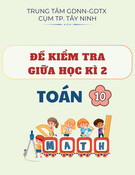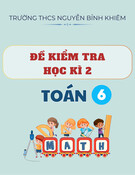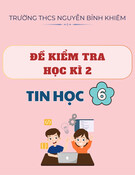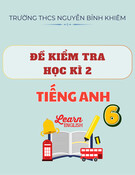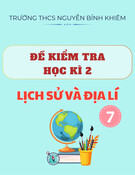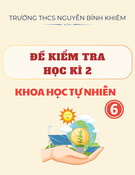
SỞ GIÁO DỤC & ĐÀO TẠO HẢI PHÒNG
TRƯỜNG THPT TRẦN HƯNG ĐẠO
Mã đề thi: 132
ĐỀ THI CUỐI HỌC KỲ 1
NĂM HỌC 2022 - 2023
MÔN: ENGLISH 12
Thời gian làm bài: 35 phút
(Thí sinh không được sử dụng tài liệu)
Họ, tên thí sinh:.....................................................................
Lớp: ............................. SBD: .............................
Mark the letter A, B, C or D to indicate the correct answer to each of the following questions.
Question 1: If we change our consumption habits, we can reduce our ______ .
A. exhaust fumes B. gases C. renewable energy D. carbon footprint
Question 2: Tom: "Can you make it at 3 p.m. on Friday for our meeting?" - Tony: “______ ”
A. OK, that's fine.
B. Very well, thanks.
C. That's not true. I met him three days ago.
D. You have a point there, but I don't think so.
Question 3: The necessary infrastructure often cannot ______ fast enough to keep up with residents’
needs.
A. excel B. expand C. expect D. exceed
Question 4: Poaching ______ the greatest threat to many species
A. presents B. poses C. produces D. creates
Question 5: Indicate the word(s) CLOSEST in meaning to the underlined word(s) in each of the
following questions.
Solar radiation can be converted either into thermal energy (heat) or into electrical energy, though the
former is easier to accomplish.
A. transformed B. absorbed C. exchanged D. released
Question 6: Indicate the word(s) OPPOSITE in meaning to the underlined word(s) in each of the
following questions.
Contaminants are subsequently removed by harvesting the above-ground shoot biomass for volume
reduction and storage.
A. later B. eventually C. previously D. afterwards
Question 7: Josh ______ televisions for 4 hours since he arrived home.
A. had been watching B. watched C. has watched D. has been watching
Question 8: Thank you for your letter. It was nice to hear ______ you again.
A. for B. of C. to D. from
Question 9: It is getting ______ for teenagers to get along well with their parents.
A. more and more difficult B. the most difficult
C. more difficult and more difficult D. as difficult as
Question 10: I joined an ______ online course taught by an experienced tutor.
A. interaction B. active C. interactive D. interact
Mark the letter A, B, C, or D to indicate the word that differs from the other three in the position of
primary stress in each of the following questions.
Question 11: A. traditional B. integration C. identity D. variety
Question 12: A. initiative B. environment C. technology D. conservation

Mark the letter A, B, C, or D indicate the word whose underlined part differs from the other three
in pronunciation in each of the following questions.
Question 13: A. holiday B. honest C. happiness D. home
Question 14: A. introduced B. developed C. raised D. influenced
Identify one underlined part in each sentence that needs correcting.
Question 15: What is the weather like in Hai Phong today? - It is bader and bader.
A. is B. the weather C. bader and bader D. in
Question 16: During the first week on campus, we have felt excited and happy, but later on we began to
find the new life frustrating in many ways.
A. frustrating B. have felt C. in D. on
Choose the letter A B,C, or D to indicate the sentence that is CLOSEST in meaning to the sentence
given in the following question.
Question 17: As he gets older, he wants to travel less.
A. The older he gets, the less he wants to travel.
B. The more old he gets, the little he wants to travel.
C. The more old he gets, the less he wants to travel.
D. The older he get, the less he want to travel.
Question 18: I've never met any more dependable person than George.
A. George is the most dependable person I've never met.
B. George is the most dependable person I've ever met.
C. I've ever met George is the most dependable person
D. George is the most dependable person I've never met.
Choose the letter A, B, C, or D to indicate the sentence that best combines each pair of sentences in
the following questions.
Question 19: People know that categorizing trash helps to recycle waste and protect the environment.
They are not willing to do it.
A. Despite knowing that categorizing trash helps to recycle waste and protect the environment, they are
willing to do it.
B. People know that categorizing trash helps to recycle waste and protect the environment, so they are
not willing to do it.
C. People know that categorizing trash helps to recycle waste and protect the environment, but they are
not willing to do it.
D. Because people know that categorizing trash helps to recycle waste and protect the environment,
they are not willing to do it.
Question 20: The jeans are over there. I told you about them last week.
A. The jeans about that I told you about last week are over there.
B. The jeans about whom I told you about last week are over there.
C. The jeans which I told you about them last week are over there.
D. The jeans which I told you about last week are over there.
Read the following passage and mark the letter A, B, C or D to indicate the correct word or phrase that
best fits each of the numbered blanks.
The Rise of Electronic Media
As printed media begin (21) ______ lose their dominance as a way to convey information to the
world, electronic media have stepped up and taken their place. Many people (22) ______ longer read
newspapers or magazines in their traditional paper forms, but they still do read. The physical delivery
system is what has happened; many people are reading newspapers or magazines off of their

smartphones, tablets, or on their computer screens. The (23) ______ of the newspapers and
magazines strive to be the same, (24) ______ the new way it is presented has some drawbacks as well as
benefits.
One of the biggest drawbacks about electronic newspapers and magazines is that they are often read
without a subscription. As electronic media are delivered instantly over the Internet, the only way (25)
______ money can be made is through advertisements, as most people don't want to pay for electronic
subscriptions. This has left many of the news outlets on the Internet scrambling to find sources of
revenue.
Question 21: A. with B. by C. for D. to
Question 22: A. no B. so C. enough D. too
Question 23: A. subjects B. contents C. amounts D. ideas
Question 24: A. but B. and C. so D. or
Question 25: A. whose B. what C. that D. whom
Read the following passage and mark the letter A, B, C or D to indicate the correct answer to each of
the questions.
That Unique Japanese Holiday called… Christmas
Christmas is such a popular holiday that it's no surprise that the Japanese celebrate it as well. To the
Western person who visits Japan at the end of the year, many sights and sounds are familiar: the Santas in
ads, the big display and the Christmas music in the stores, the lights on the houses, stocking stuffed with
toys, and decorated trees.
But look a bit closer and you begin to realize that the Japanese interpretation of Christmas is
something rather different. For one thing, Christmas is more of a fun start to the holidays rather than the
main event. In Japan, the most important holiday of the season is New Year's Day, which comes one
week later. New Year is the big traditional holiday when family and friends get together. In fact,
Christmas is not officially a holiday at all-most people have to work that day unless it happens to fall on a
weekend. As a result, people celebrate on Christmas Eve.
As in the West, gift-giving is a big part of the holiday, but it takes on its own character in Japan. On
their big night out, romantic partners may give other jewelry. Within the family, parents may give
presents to their young children, although it's usually not vice versa. The idea here is that the gifts come
from Santa Clause, so it only makes sense to give them while the children are still young enough to
believe in Santa. It is customary to give presents called oseibo to bosses and colleagues, to teachers, or to
other people outside the immediate circle of friends and family. These gifts function as a way of showing
appreciation to people who have performed some type of service for you.
Christians make up only a very small part (less than two percent) of the population of Japan, so people are
not very familiar with the religious roots of the holiday. Nevertheless, the Japanese have an amazing
ability to import elements from other cultures and integrate them with their own culture. For example,
Buddhism, the parliamentary form of government, large corporations, and the current educational system
all originally came from abroad. These things are so successful in today's Japan precisely because they
are no longer exactly the same as they were. Like Christmas, the Japanese made them uniquely their own.
Question 26: What is similar about the Western and Japanese Christmas?
A. Many people go to church.
B. Santa Claus is a popular figure.
C. Christmas cakes are sold everywhere.
D. They don't go to work on Christmas Day.
Question 27: What is the most important day of the festive season in Japan?
A. New Year’s Eve B. New Year's Day
C. Christmas Eve D. Christmas Day
Question 28: Who might a Japanese person give oseiho to?

A. someone they just meet B. their best friend
C. their young child D. their secretary
Question 29: What is the main idea of the last paragraph?
A. The Japanese are good at adopting and adapting traditions.
B. Things need to be changed to be successful in Japan.
C. The Japanese love foreign cultures.
D. Christmas is not a religious holiday in Japan.
Question 30: The purpose of this passage is to ______ .
A. encourage people to visit Japan for Christmas
B. compare Western and Japanese holidays
C. explain why Christmas is so popular in Japan
D. explore the concept of a Japanese Christmas
-----------------------------------------------
----------- HẾT ----------

SỞ GIÁO DỤC & ĐÀO TẠO HẢI PHÒNG
TRƯỜNG THPT TRẦN HƯNG ĐẠO
Mã đề thi: 209
ĐỀ THI CUỐI HỌC KỲ 1
NĂM HỌC 2022 - 2023
MÔN: ENGLISH 12
Thời gian làm bài: 35 phút
(Thí sinh không được sử dụng tài liệu)
Họ, tên thí sinh:.....................................................................
Lớp: ............................. SBD: .............................
Read the following passage and mark the letter A, B, C or D to indicate the correct answer to each of
the questions.
That Unique Japanese Holiday called… Christmas
Christmas is such a popular holiday that it's no surprise that the Japanese celebrate it as well. To the
Western person who visits Japan at the end of the year, many sights and sounds are familiar: the Santas in
ads, the big display and the Christmas music in the stores, the lights on the houses, stocking stuffed with
toys, and decorated trees.
But look a bit closer and you begin to realize that the Japanese interpretation of Christmas is
something rather different. For one thing, Christmas is more of a fun start to the holidays rather than the
main event. In Japan, the most important holiday of the season is New Year's Day, which comes one
week later. New Year is the big traditional holiday when family and friends get together. In fact,
Christmas is not officially a holiday at all-most people have to work that day unless it happens to fall on a
weekend. As a result, people celebrate on Christmas Eve.
As in the West, gift-giving is a big part of the holiday, but it takes on its own character in Japan. On
their big night out, romantic partners may give other jewelry. Within the family, parents may give
presents to their young children, although it's usually not vice versa. The idea here is that the gifts come
from Santa Clause, so it only makes sense to give them while the children are still young enough to
believe in Santa. It is customary to give presents called oseibo to bosses and colleagues, to teachers, or to
other people outside the immediate circle of friends and family. These gifts function as a way of showing
appreciation to people who have performed some type of service for you.
Christians make up only a very small part (less than two percent) of the population of Japan, so people are
not very familiar with the religious roots of the holiday. Nevertheless, the Japanese have an amazing
ability to import elements from other cultures and integrate them with their own culture. For example,
Buddhism, the parliamentary form of government, large corporations, and the current educational system
all originally came from abroad. These things are so successful in today's Japan precisely because they
are no longer exactly the same as they were. Like Christmas, the Japanese made them uniquely their own.
Question 1: What is similar about the Western and Japanese Christmas?
A. They don't go to work on Christmas Day.
B. Christmas cakes are sold everywhere.
C. Many people go to church.
D. Santa Claus is a popular figure.
Question 2: What is the most important day of the festive season in Japan?
A. Christmas Day B. New Year’s Eve C. New Year's Day D. Christmas Eve
Question 3: Who might a Japanese person give oseiho to?
A. someone they just meet B. their best friend
C. their secretary D. their young child
Question 4: What is the main idea of the last paragraph?
A. Things need to be changed to be successful in Japan.


![Đề thi Tiếng Anh có đáp án [kèm lời giải chi tiết]](https://cdn.tailieu.vn/images/document/thumbnail/2025/20250810/duykpmg/135x160/64731754886819.jpg)
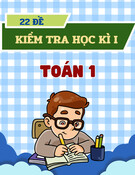
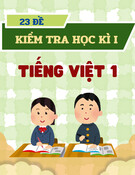


![Đề thi học kì 2 Vật lý lớp 11: Đề minh họa [Mới nhất]](https://cdn.tailieu.vn/images/document/thumbnail/2025/20250709/linhnhil/135x160/711752026408.jpg)
